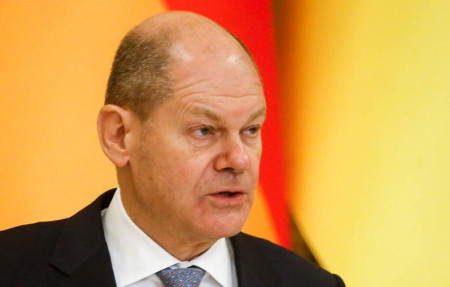
The upcoming Sunday, February 23 will be marked by an early election to Germany’s federal parliament. 59.2 million burghers eligible to vote will be invited to take part. In this regard, the capital's Berliner Zeitung cited data compiled last Saturday, February 15, on forecasts about the level of support parties could expect to get into the Bundestag. Thus, this is what the latest survey showed. The CDU/CSU bloc is consistently leading the way with 30.3 percent of the vote (+ 0.7 p/p as compared to the figure a week earlier), the Alternative for Germany (AfD) party remains the runner-up enjoying 20.3 percent (drop by 0.2 p/p) and is followed by the SPD with 15.2 percent (drop by 0.8 p/p), the Greens with 13.4 percent (+ 0.1 p/p), and the Left Party with 5.8 percent (+0.7 p/p). Meanwhile, the newly created Sarah Wagenknecht Alliance (Bündnis Sahra Wagenknecht, BSW) and the FDP (Free Democrats) have yet to overcome the five-percent threshold for entering the parliament, the forecast claims.
At the same time, German sources admit certain discrepancies in pre-election forecasts by various sociological institutes. For example, the reputable Wahlkreisprognose and Allensbach centers see the level of support for the CDU/CSU bloc in the region at 32 percent. Other pollsters do not release figures exceeding 29 percent. A similar difference can be observed in prospect estimates for the AfD (from 19 to 21 percent), the Social Democrats (from 12.5 to 17 percent), the Greens (12-14 percent), and the Left (4-7 percent). As for the BSW and the FDP, forecasts range from 4 to 5 percent of possible voter support.
However, while no one doubts the CDU/CSU bloc's victory in the upcoming race, with the chancellor's seat firmly reserved for CDU chairman Friedrich Merz, the key mystery to the German political class remains as follows: which of the current rivals will the bloc prove able to form a government coalition with? The German wahlrecht.de portal, which specializes in electoral law issues, believes that the SPD-Greens-FDP triumvirate that has ruled for the past three years will fail to gain over 32.7 percent and is not going to reign anymore.
What other options are there to suggest? CDU/CSU with the Greens (43.7 percent) is possible in theory, thought fraught with lots of political controversy; SPD with the Greens can only secure 28.6 percent, which is too far from a Bundestag majority; the so-called "Grand Coalition" comprising CDU/CSU and the SPD (45.5 percent) is a familiar combination and enough for stable cooperation, but presents a rather conflict-ridden construct for the time being; the CDU/CSU bloc plus AfD (50.6 percent) would have a majority in parliament, but from the CDU's point of view, cooperation of the kind is physically impossible over AfD’s political undesirability recognized by all the national parliamentary parties.
However, judging from Western politicians’ skills to easily change their political preferences, doing about-turns every now and then, one can assume that, given US Vice President J.D. Vance’s opinion as he recently accused the German establishment in Munich of lacking democracy and willingness to heed to their voters, while recalling the words by Donald Trump’s close associate billionaire Elon Musk about AFD’s relevance in the future of Germany, Friedrich Merz will agree to cooperate with Alternative for Germany after all. Of course, this will become another nationwide scandal, but "for the sake of transatlantic unity" it's going to be worth the cost to Merz, if approved by overseas curators.
In the meantime, the CDU is doing its best to inflate the scandal around SPD leader Olaf Scholz, who tirelessly reiterates his intent to become Chancellor of Germany again. This refers to a piece in Munich’s Focus magazine, which reported that a private party in the capital saw Scholz call black senator for culture Joe Chialo "a court jester" and "CDU’s fig leaf." All the party’s functionaries led by Friedrich Merz immediately launched an interview campaign to strongly condemn "Scholz the racist" who insulted their party comrade with Tanzanian roots. Moreover, they emphasize that "such a person is not worthy to apply for Chancellor of Germany." Naturally, Scholz had to justify himself both in the press and on TV, but chances are high that the scandal did affect the SPD’s electoral ratings as well.
However, all the German internal squabbles are small stuff against the fact that allegedly "prudent Chancellor Olaf Scholz," who turned Germany into Europe's largest sponsor of the Kiev regime by providing Zelensky with Leopard tanks, self-propelled anti-aircraft guns, howitzers, armored personnel carriers and plenty of ammunition, is going to be replaced by Friedrich Merz, the one willing to expand military supplies to the Armed Forces of Ukraine by means of long-range Taurus cruise missiles.


